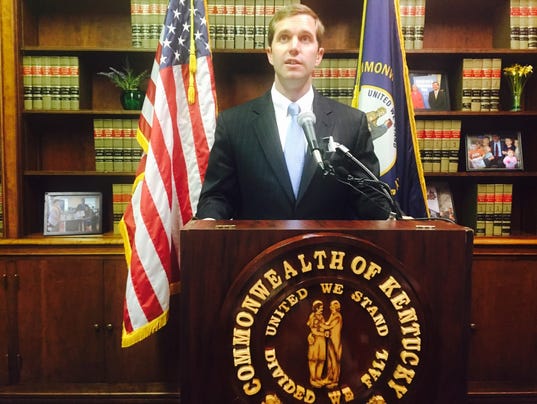Deborah Yetter, @d_yetter –

(Photo: Tom Loftus/The CJ)
FRANKFORT, Ky. – Franklin Circuit Judge Thomas Wingate said he will rule within a few weeks on whether Gov. Matt Bevin has the authority to cut funds to higher education in the current fiscal year.
Meanwhile, Attorney General Andy Beshear, who is challenging that action, and lawyers for Bevin struck a deal in which the administration will set aside some $18 million in higher education funds at stake while Wingate decides the case.
“We will rule on this very quickly,” Wingate told the lawyers for both sides at a hearing Thursday.
Wingate also won’t issue an injunction Beshear had sought to block the cuts after the parties agreed it is not needed under the temporary deal reached Thursday.
Stephen Pitt, Bevin’s general counsel, offered to set aside funds temporarily while the case is resolved, which Beshear accepted.
Beshear insists the governor lacks the authority to order any cuts absent specific evidence of a budget shortfall, and he filed suit last week to block the cuts.
Pitt maintains the governor acted within his power and is asking the judge to dismiss the case.
The $18 million represents the 2 percent cuts Bevin imposed on the state’s public universities and community colleges, except for Kentucky State University, which was spared any cuts. Initially, Bevin slashed 4.5 percent from the colleges and universities but reduced that to 2 percent Wednesday as part of a compromise with university presidents prior to the General Assembly’s final action April 15 on the state’s next two-year budget.
The new budget cuts higher education by 4.5 percent over the next two years, rather than the 9 percent Bevin originally proposed. Kentucky State, the smallest of the state four-year universities and a historically black college, also is exempt from those cuts.
One focus of the debate at Thursday’s hearings was the role of university presidents and their agreement with Bevin over the cuts reached at a private meeting at the governor’s mansion before lawmakers enacted a budget.
Pitt noted that none of the state university presidents filed suit to challenge the cuts. “The real parties of interest did not step forward,” he said. “They made a deal.”
That prompted Wingate to wonder about details of the agreement. “It does seem a little strange that they’re not here,” he said.
Pitt said he wasn’t familiar with the “nuances” of the agreement but said it was outlined in a letter the presidents sent to the governor.
Beshear has pointed out that in that letter, the university presidents agreed to accept the cuts of 2 percent in the current fiscal year only “if it is determined by the courts to be permissible.”
Beshear said after the hearing that he believes the university officials may have been pressured to cooperate.
“I have concerns that the university presidents felt extreme pressure given that the governor and the executive branch approve numerous contracts and appoint trustees,” he said.
Wingate did not rule on the request of three state representatives to join as plaintiffs in Beshear’s lawsuit. House Democrats Mary Lou Marzian, Darryl Owens and Jim Wayne, all of Louisville, are seeking to intervene in the case to challenge Bevin’s authority to cut higher education.
Wingate said he will rule later on that issue as well and told the lawyers to expect to be back in court on the matter in about two weeks.
Contact reporter Deborah Yetter at (502)582-4228 or at [email protected].
